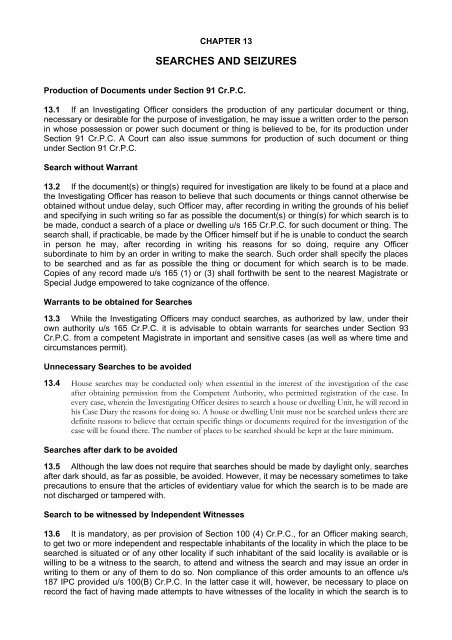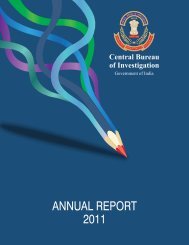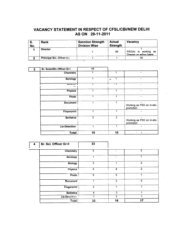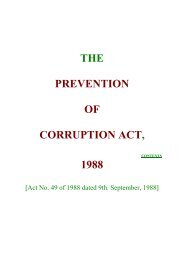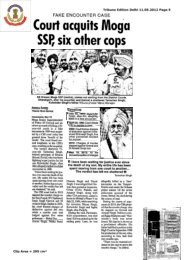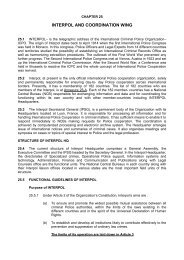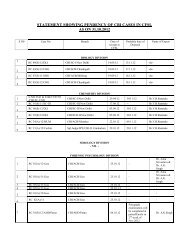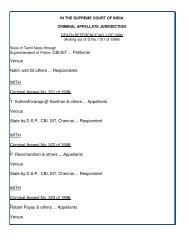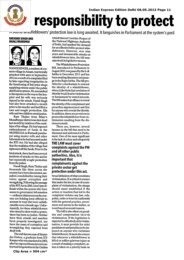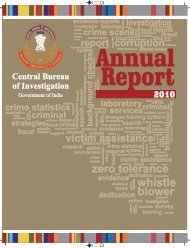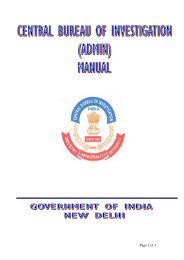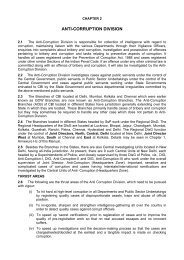Searches and Seizures - Central Bureau of Investigation
Searches and Seizures - Central Bureau of Investigation
Searches and Seizures - Central Bureau of Investigation
Create successful ePaper yourself
Turn your PDF publications into a flip-book with our unique Google optimized e-Paper software.
sent through encrypted electronic mail message with digital signatures <strong>of</strong> the Officer(s)concerned. The SsP should exercise due caution against possible leakage. A watch <strong>of</strong>the place to be searched may be kept wherever necessary during the period <strong>of</strong>verification <strong>of</strong> information. It will not be possible to follow this procedure in certainemergent cases where there is evident risk <strong>of</strong> loss <strong>of</strong> evidence due to inherent delays.In such cases, the provisions <strong>of</strong> Section 165 Cr.P.C. may be invoked after completingall necessary legal formalities, including preparation <strong>of</strong> grounds <strong>of</strong> search. <strong>Searches</strong>after dark should be avoided as far as possible. In such cases, it is for the Branch SP topersonally satisfy himself about the need for taking emergent action. However,approval <strong>of</strong> the Competent Authority should be taken as soon as possible.(c) Soon after registration <strong>of</strong> the case, the need for conducting searches should beevaluated <strong>and</strong> the proposal for search should be sent to the Competent Authoritywithout causing undue delay.(d) In case during the course <strong>of</strong> a search/investigation/enquiry, the involvement <strong>of</strong> anOfficer <strong>of</strong> the level <strong>of</strong> Joint Secretary <strong>and</strong> above becomes apparent, theinquiry/investigation against the latter would be initiated only after obtaining permissionu/s 6-A <strong>of</strong> DSPE Act.(e) Members <strong>of</strong> the search party should be fully briefed about their allotted tasks <strong>and</strong> aboutthe do’s <strong>and</strong> don’ts on searches contained in this Manual <strong>and</strong> other instructions issuedfrom time to time, before they set out for actual search.(f) Once a search party reaches the place <strong>of</strong> search <strong>and</strong> starts the proceedings, normallypersons from the house should not be allowed to go out or outsiders allowed to comein. However, in genuine cases like school going children <strong>and</strong> medical emergency etc.the persons may be allowed to go <strong>and</strong> come after proper personal search. If the personwhose house is being searched happens to be out at that time <strong>and</strong> returns during thecourse <strong>of</strong> search, he would, <strong>of</strong> course, be allowed to come in. The search party shouldhave control over all the access points <strong>and</strong> outlets to the house. The search partyshould also take control <strong>of</strong> the telephones.(g) The addresses <strong>and</strong> places to be searched should be verified before taking a decision<strong>and</strong> confirmed before searches are actually launched.(h) Whenever searches are being organized, monitoring <strong>of</strong> the progress by senior Officersinvolved should be done at the Branch. A st<strong>and</strong>-by reserve team along with a vehicleshould also be kept at the Branch/Unit, to move immediately to assist a search party.Whenever required, it could also be utilized if, during a search, necessity <strong>of</strong> searchingother premises arises.(i) As far as possible, searches should be completed in one stretch. In case, search is tocontinue, after a break, on the next day due to any reason, the premises should beproperly sealed in the presence <strong>of</strong> witnesses <strong>and</strong> unsealed again in their presence.Adequate guarding/ security arrangement should be ensured for this period.(j) In cases, such as those <strong>of</strong> disproportionate assets, searches could be held not only atthe residence <strong>and</strong> <strong>of</strong>fice <strong>of</strong> the suspect Officer, but also at the place <strong>of</strong> his closerelation, friends <strong>and</strong> Chartered Accountants etc., who very <strong>of</strong>ten are entrusted withincriminating documents. Such an assessment will have to be made prior to theregistration <strong>of</strong> the case. In cases <strong>of</strong> disproportionate assets, a separate inventoryshould be prepared <strong>of</strong> items, which are not seized. The value, preferably as peragreement <strong>of</strong> all concerned, should be indicated against each item. Milometer reading<strong>of</strong> cars <strong>and</strong> scooters should also be shown in the inventory list. A conscious effortshould be made to locate <strong>and</strong> seize the locker keys; which have a typical appearance.The locker concerned should be located quickly <strong>and</strong> sealed for conducting a searchlater on (within a day or two), if immediate search is not possible.(k) <strong>Searches</strong> should not, unless unavoidable, be carried out on the occasion <strong>of</strong>festivals/celebrations or mourning etc. going on in the house concerned.Page 3 <strong>of</strong> 10
(l) <strong>Searches</strong> must always be conducted quickly <strong>and</strong> quietly <strong>and</strong> in a manner to avoidunnecessary embarrassment, humiliation or inconvenience to the occupants <strong>and</strong>members <strong>of</strong> their families. Due courtesy should be shown to them.(m) In cases <strong>of</strong> disproportionate assets, articles <strong>of</strong> trifling value <strong>and</strong>/or daily use need notbe mentioned individually in the search list nor seized. It would, however, be useful tonote down the lump sum value <strong>of</strong> such articles in the house. Colour photographs <strong>of</strong>various parts <strong>of</strong> the house should be taken <strong>and</strong> got signed at the back by thephotographer. His statement should also be recorded under Section 161 Cr.P.C.(n) Disproportionately large cash or jewellery, unaccounted foreign exchange, costlyelectronic gadgets, arms <strong>and</strong> ammunition without licence etc. should be seized. Itshould be borne in mind that even if such an item is not covered by the search warrant,Section 102 Cr.P.C. could be invoked.(o) The size <strong>of</strong> the raiding party should depend on the requirements. Show <strong>of</strong> force shouldbe avoided. If for any special reasons, some force is required, it may be kept in reserveat some distance. However in important cases where violent conduct on part <strong>of</strong> theaccused or individual being searched is expected, adequate assistance <strong>of</strong> local Policeshould be taken. SP <strong>of</strong> the Branch may make an assessment <strong>and</strong> take necessarysteps.(p) Officers not below the rank <strong>of</strong> Inspector should invariably head search parties. In case<strong>of</strong> searches <strong>of</strong> houses <strong>of</strong> senior Officers or big firms, the SP should supervise thesearches personally. According to the importance <strong>of</strong> the case, the DIG concerned alsoshould supervise such searches. However, the DIG/SP shall not be a formal witness tothe search, as he would not remain continuously present during the searches.(q) Informants/colleagues/subordinates <strong>of</strong> the public servant/accused whose house issearched should not as a rule be selected as search witnesses <strong>and</strong> should notaccompany the search party.13.10 In the inventory that is prepared, the incriminating documents should be listed with relevantdetails. The remaining documents could be inventorised in bulk. However, page numbering <strong>and</strong>identity should be given <strong>and</strong> the witnesses etc. should individually initial the contents.13.11 No unauthorized Press publicity should be given about the searches. Strict instructionsshould be given to members <strong>of</strong> the raiding party not to divulge any information about searches tounauthorized persons.13.12 A search report should be sent to the Officer with whose permission the case wasregistered or the searches were conducted at the earliest <strong>and</strong> in any case not later than a weekafter the search along with the analysis <strong>of</strong> the same. Apart from the evidence collected, the reportshould also mention the time at which the search began <strong>and</strong> ended, the constitution <strong>of</strong> eachsearch party <strong>and</strong> any other fact, which may be relevant. In case the preparation <strong>of</strong> search list etc.has taken an unduly long time, this fact should also be clearly brought out in the report.13.13 When the I.O. <strong>of</strong> one Branch goes to conduct a search in a place within the jurisdiction <strong>of</strong>another Branch, the SP <strong>of</strong> the latter Branch should be contacted to depute an Officer <strong>of</strong> his Branchto be present at the time <strong>of</strong> search. Necessary endorsement in the search warrant should beobtained before conducting a search if a house is located outside the jurisdiction <strong>of</strong> the Magistrateissuing the search warrant. (Sections 78 <strong>and</strong> 79 Cr.P.C.)13.14 In the course <strong>of</strong> a search, it should be ensured that the legal rights <strong>of</strong> the person searchedare respected because any violation there<strong>of</strong> may affect the search adversely. The occupant <strong>of</strong> thepremises reserves the following rights: –(i)(ii)to see the warrant <strong>of</strong> authorization duly signed <strong>and</strong> sealed by the issuing authority;to verify the identity <strong>of</strong> each member <strong>of</strong> the search party;Page 4 <strong>of</strong> 10
(iii)(iv)(v)(vi)(vii)to have at least two respectable <strong>and</strong> independent residents <strong>of</strong> the locality aswitnesses;to have personal search <strong>of</strong> all members <strong>of</strong> the search party before commencement<strong>and</strong> conclusion <strong>of</strong> the search;to ensure that a personal search <strong>of</strong> females are carried out by another female only,with strict regard to decency;to have a copy <strong>of</strong> the panchnama together with all annexures, for whichacknowledgment should be given;to call a medical practitioner, if required;(viii) to have the children permitted to go to school, after discreet examination <strong>of</strong> theirbags; <strong>and</strong>(ix)to have the facility <strong>of</strong> having meals etc. at the normal time.13.15 Copy <strong>of</strong> the search list/seizure memo may also be made available to the Departmentconcerned, whenever the Departments make a specific request in the said regard.Statements under Section 161 Cr.P.C. <strong>of</strong> the Search Witnesses13.16 The I.O. shall record the statements <strong>of</strong> the search witnesses under Section 161 Cr.P.C.,immediately after completion <strong>of</strong> the search.Search <strong>and</strong> Seizure <strong>of</strong> Digital Evidence13.17 In order to avoid duplication, the principles <strong>and</strong> procedures to be followed while seizingdigital evidence have been given in detail in the Chapter No.18 <strong>of</strong> this manual.Production <strong>of</strong> Government Records13.18 The Police Officers <strong>of</strong> DSPE are authorized to inspect <strong>of</strong>ficial or secret records at all stages <strong>of</strong> theinvestigation. They can, therefore, have access to all <strong>of</strong>ficial records required by them for the purpose <strong>of</strong>investigation or for production in Courts. The detailed procedure in respect <strong>of</strong> records/ documents <strong>of</strong>certain Departments is described in the following paragraphs:–(i)Post Office Records – Officers <strong>of</strong> the DSPE have no authority to require theproduction <strong>of</strong> letters, postcards, parcels, telegraphs or other documents or things inthe custody <strong>of</strong> Postal or Telegraph authorities. The procedure prescribed in Section92 Cr.P.C. must be followed if their production is considered necessary. Thisprohibition, however, does not extend to the other ordinary records maintained in apost <strong>of</strong>fice <strong>and</strong> information available in them shall be given on the written order <strong>of</strong> theInvestigating Officer. Only those entries in such records will, however, be disclosed,which relate to the person or persons accused <strong>of</strong> the <strong>of</strong>fence under investigation orwhich are relevant to the <strong>of</strong>fence.(ii) Securing <strong>of</strong> Income-Tax Records – It is permissible under the Income-Tax Act, 1961,subject to the provision <strong>of</strong> any notification issued under Section 138(2) <strong>of</strong> the Act, toobtain any information in respect <strong>of</strong> the assessment <strong>of</strong> any assessee <strong>and</strong> to ask forthe inspection <strong>of</strong> assessment records or any other information contained thereineither by making an application under Section 138(i) <strong>of</strong> the Act or by sending arequisition under Section 91 Cr.P.C. or from any list <strong>of</strong> assesses published by the<strong>Central</strong> Government under section 187 Income-Tax Act. However, in view <strong>of</strong> verylarge number <strong>of</strong> assesses, the Ministry <strong>of</strong> Finance do not publish assessment figuresin all cases particularly as the assessments would be in the names <strong>of</strong> the firms <strong>and</strong>not in the names <strong>of</strong> individuals. The latter source <strong>of</strong> information would therefore,Page 5 <strong>of</strong> 10
(iii)(iv)ordinarily not be available. DSPE Officers should obtain the requisite information, asa rule by sending a requisition under section 91 Cr.P.C., instead <strong>of</strong> making anapplication under Section 138(i) <strong>of</strong> the Income-Tax Act, 1961.Production <strong>of</strong> Records by Bank <strong>and</strong> Public Offices – It should be considered assufficient compliance <strong>of</strong> an order under Section 91 Cr.P.C. by Banks or Public Officesif the required documents or books are shown or produced at the bank premises or inpublic <strong>of</strong>fices as the case may be. IOs should not generally insist on an Officer <strong>of</strong> theBank attending <strong>and</strong> producing the records at any place other than the Bank premises.Section 18 <strong>of</strong> the Prevention <strong>of</strong> Corruption Act, 1988 provides that certified copies <strong>of</strong>the relevant entries relating to the accounts in the Bankers’ Books <strong>of</strong> any personsuspected to have committed any <strong>of</strong>fence under that Act, or <strong>of</strong> any other personsuspected to be holding money on behalf <strong>of</strong> such person can be taken or caused tobe taken <strong>and</strong> the bank concerned is bound to assist in the exercise <strong>of</strong> these powers.These powers can, however, be exercised only by a Police Officer empowered toinvestigate under Section 17 <strong>of</strong> the Prevention <strong>of</strong> Corruption Act, 1988 provided thatthey shall not be exercised by a Police Officer below the rank <strong>of</strong> a Superintendent <strong>of</strong>Police, unless he is especially authorized in this behalf by Police Officer <strong>of</strong> or abovethe rank <strong>of</strong> a Superintendent <strong>of</strong> Police. Copies <strong>of</strong> Statement <strong>of</strong> Accounts certifiedunder the Bankers’ Books Evidence Act are admissible in evidence withoutproduction <strong>of</strong> the Books/Ledgers in the Court.Records pertaining to Company – Any Registrar <strong>of</strong> companies should not be askedunder the provisions <strong>of</strong> Section 209A <strong>of</strong> the CompaniesAct for seizure <strong>of</strong> records in such cases where records are required by the DSPE.DSPE Officers may conduct search for the records, at the premises <strong>of</strong> the companyor procure it by issuing notice under Section 91 Cr.P.C. In spite <strong>of</strong> having enablingstatutory powers to search or to dem<strong>and</strong> production <strong>of</strong> documents the Officersnormally conduct themselves with the active cooperation <strong>of</strong> the Departmentconcerned for smooth progress in the investigation. Therefore, the InvestigatingOfficers should try to enlist the support <strong>and</strong> cooperation <strong>of</strong> the concerned R.O.C. whomay render all assistance to DSPE in exercise <strong>of</strong> their powers under Section 209A <strong>of</strong>Companies Act <strong>and</strong> then inspect the same for doing the needful <strong>and</strong>/or take attestedcopies there<strong>of</strong> for the purpose <strong>of</strong> carrying on investigation.The DSPE <strong>of</strong>ficials while investigating any case against any Company or itspartners/Manager/Director can seize any account book or papers, as per theprocedure laid down in the Cr.P.C., from the statutory functionaries <strong>of</strong> the company orfrom any place where the relevant documents are available, including the accountbooks called by Registrar <strong>of</strong> Companies for their inspection under Section 209A <strong>of</strong>the Companies Act. For seizure <strong>of</strong> documents while investigating any case, the DSPEOfficers need not invoke Section 209A <strong>of</strong> Companies Act as the Cr.P.C. containsenough provisions in different Sections like 102, 91, 51 etc. to summon or seize anydocument or thing required for the purpose <strong>of</strong> investigation.In order to obtain the original documents filed by the Department/Public SectorUndertakings including the Banks in the Courts in civil matters we may approach theDepartment/ Public Sector Undertakings to file photostat copies <strong>of</strong> the documents inthe Courts <strong>and</strong> make available the original records to the DSPE for expeditinginvestigation in the connected cases.Unnecessary Inconvenience to Parties to be avoided13.19 While exercising the powers under Section 91 Cr.P.C. or while taking into possessiondocuments, records etc., required for the investigation, the Investigating Officer must be carefulnot to act in a manner, which may cause unnecessary hardship or dislocation <strong>of</strong> work to thepersons or <strong>of</strong>fices concerned.Memos for Records taken into PossessionPage 6 <strong>of</strong> 10
13.20 In all cases, where any records or articles are taken into possession during the course <strong>of</strong>investigation without formal search, a proper recovery memo in prescribed form attested by tworespectable witnesses <strong>and</strong> the person from whom the records or articles are taken possession <strong>of</strong>should invariably be prepared on the spot <strong>and</strong> each <strong>of</strong> the documents or articles should be gotinitialed <strong>and</strong> numbered by the persons producing it <strong>and</strong> the witnesses to preclude any changes orsubstitution.Records <strong>of</strong> Seized Property Deposited in Malkhana13.21 As soon as any property is seized, the Investigating Officer should h<strong>and</strong> over the propertyalong with a copy <strong>of</strong> the seizure memo to the Officer-in-charge <strong>of</strong> the Malkhana who will make anentry in the Malkhana Sub-Module or Seized Property Register. Entries in the Malkhana Sub-Module or Seized Property Register should be made chronologically <strong>and</strong> blank spaces should notbe left for entering subsequent seizures in the case. Seizure <strong>of</strong> cash (including trap money),jewellery <strong>and</strong> other valuables will also be entered in this register. In case, entries are made in theregister, the same pertaining to the cash should be made in red ink. All such money <strong>and</strong> valuableswill be deposited with the Malkhana by the Investigating Officer in the first instance in sealedcovers <strong>and</strong> will be entered in the Malkhana Register by the Officer-in-charge <strong>of</strong> the Malkhana.After that, the sealed cover will be re-sealed in bigger covers or in small box in the presence <strong>of</strong>Sr.PP or any other Law Officer for safe custody in a safe/locker. A record <strong>of</strong> sealing <strong>of</strong> the coversor the boxes, as the case may be <strong>and</strong> their contents will be made in the Malkhana Register <strong>and</strong>will be signed by the Officer in charge <strong>of</strong> the Malkhana <strong>and</strong> the Sr.PP or any other Law Officer.Valuable jewellery <strong>and</strong> cash whose identity is required to be established in the Court, must be keptin the locker <strong>of</strong> a Nationalized Bank, which should be hired by the Branch for Joint operation by theBranch SP <strong>and</strong> the Malkhana Incharge <strong>of</strong> the Branch. The cash whose identity is not required tobe established, should be deposited in the Nationalized Bank in a Current Account operable jointlyby the SP <strong>of</strong> the Branch <strong>and</strong> the Malkhana Incharge <strong>and</strong> a remark to the said effect must bemade against the relevant entries in the Malkhana Register/Sub-Module <strong>of</strong> CRIMES for readyreference <strong>and</strong> further necessary action for disposal <strong>of</strong> the properties so seized by CBI.13.22 Record <strong>of</strong> seized property shall be maintained in the Malkhana Sub-Module <strong>of</strong> CRIMES or in theprescribed form in all the CBI Branches. Data entry in Malkhana Sub-Module in the Crimes Moduleshall be made by the Malkhana incharge on real-time basis. This Module must be actively utilized by theBranch for day-to-day h<strong>and</strong>ling <strong>of</strong> documents/material objects kept in the Malkhana. This record willbe maintained year wise. It will show the items carried over from the previous year in the Malkhana.13.23 The Officer-in-charge <strong>of</strong> the Malkhana shall place the Seized Property Register before theSuperintendent <strong>of</strong> Police <strong>of</strong> the Branch once in two months for his check <strong>and</strong> inspection. TheSuperintendent <strong>of</strong> Police should check the sealed covers or boxes containing seized money orvaluables once in a month at least.13.24 The Officer-in-charge <strong>of</strong> the Malkhana shall prepare a monthly statement <strong>of</strong> seizedproperty pending in the Malkhana at the end <strong>of</strong> the month through Malkhana Sub-Module <strong>of</strong>CRIMES or in the following pr<strong>of</strong>orma in the register itself.Sl.No.Item No. RC/PE No. Date <strong>of</strong>seizureReasons forpendencyRemarks13.25 The Law Officer looking after the Malkhana should scrutinize it <strong>and</strong> issue necessarydirections. He shall countersign the statement after satisfying himself that all the propertiesentered in the record are available <strong>and</strong> no un-recorded property has been kept in the Malkhana.He will take rectification steps in case any discrepancy is noticed. He is also required to carry out adetailed inspection every three months. He may also carry out additional surprise inspections. Inaddition, the SP <strong>of</strong> the Branch should physically check the Malkhana in January <strong>and</strong> July eachPage 7 <strong>of</strong> 10
year to ensure that the properties in the Malkhana are available as per the Malkhana Module orRegister.13.26 Items or documents kept in the Malkhana may be required during the course <strong>of</strong>investigation or trial <strong>and</strong> hence these may be issued to the Law Officer <strong>and</strong> Investigating Officerh<strong>and</strong>ling the trial case. A provision has been made for such issue <strong>and</strong> receipt in Malkhana Sub-Module. Any item, so required, may be temporarily issued only after making the necessary dataentries in the said Module. Similar entries would be made once these are received back.Whenever the Malkhana Sub-Module is not working, a Temporary Issue Register in the followingform will be maintained for keeping a record <strong>of</strong> items issued to the Law Officer <strong>and</strong> investigatingOfficer h<strong>and</strong>ling the case. The status <strong>of</strong> temporarily issued items will be reviewed every month bythe Law Officer-in-charge <strong>of</strong> the Malakhana. In case, it is felt that a document/item has beenpending with an Officer for a long time, he may be asked to return the same. The Branch SP mayalso exercise necessary supervision in this regard by reviewing such temporarily issued items atleast once a month <strong>and</strong> take steps to get these documents/ items back if these are no longerrequired by the concerned Officer(s).Sl.No.ItemNo.RC/PE No.Name <strong>of</strong>I.O. or LawOfficerissueddocuments<strong>and</strong> anyother itemSignatures <strong>of</strong>the Officer towhom thedocument/item is issuedwith dateDate <strong>of</strong>IssueDate <strong>of</strong>returnSignature <strong>of</strong>the MalkhanaInchargereceivingback thedocuments/articles13.27 In case the property is produced in the Court or before an Enquiry Officer conductingDepartmental enquiry as an exhibit, the Law Officer/Presenting Officer concerned should send areport to the Malkhana Incharge. Similarly, in cases where property has been given to the IOs forbeing returned to the parties concerned, the IOs should submit the acknowledgment <strong>of</strong> the partyconcerned before the Malkhana Incharge at the earliest. If for some reasons, the property couldnot be returned to the party, it should be promptly returned to the Malkhana Incharge. The return<strong>of</strong> property to the concerned parties will be monitored by the Law Officer- in-charge <strong>of</strong> theMalkhana on every fortnight. The records <strong>of</strong> properties taken out <strong>of</strong> Malkhana would be maintainedthrough a prescribed invoice generated through Malkhana Sub-Module or in a printed pro-forma tobe maintained in triplicate. The Law Officer-in-charge <strong>of</strong> Malkhana <strong>and</strong> SsP should ensure thatthese invoices are used for transmitting property.Inspection <strong>of</strong> Documents13.28 Whenever inspection <strong>of</strong> documents kept in the Malkhana is permitted by a Court, the LawOfficer-in-charge <strong>of</strong> Malkhana or the SP <strong>of</strong> the Branch should make an Officer responsible forsupervising such inspection. Such designated Officer shall be responsible for ensuring safety <strong>of</strong> allthe documents. In important cases, even two or more Officers could be nominated for beingpresent at the time <strong>of</strong> inspection. Persons conducting inspection should be searched <strong>and</strong> notallowed to carry anything by which he could damage or destroy the documents. Under nocircumstances he should be permitted to carry any match sticks, cigarette lighters, ink or ball pointpens etc. He may be permitted only to carry white papers <strong>and</strong> pencils for making notes if they sodesire. The Officer-in-charge <strong>of</strong> Malkhana supervising the inspection should maintain a register inwhich details <strong>of</strong> the orders for inspection <strong>of</strong> document, <strong>and</strong> description <strong>of</strong> documents whoseinspection has been permitted should be entered. This register will be seen <strong>and</strong> signed by the LawOfficer-in-charge <strong>of</strong> the Malkhana or the SP <strong>of</strong> the Branch.13.29 The Officer-in-charge <strong>of</strong> the Malkhana in each Branch will be responsible for the security <strong>of</strong>the articles kept therein. He may be provided with the assistance <strong>of</strong> an Armed Guard, whereverfeasible <strong>and</strong> necessary. The Superintendent <strong>of</strong> Police should pay frequent visits to the Malkhanato ensure that necessary precautions against fire, water seepage or any other damage to articlesare taken.Page 8 <strong>of</strong> 10
13.30 Whenever a new Officer takes charge <strong>of</strong> the Malkhana or is made temporary incharge incase <strong>of</strong> Malkhana Incharge going on leave or duty, he should check each item <strong>and</strong> submit acertificate to that effect, to the Incharge Law Officer after due checking <strong>and</strong> verification. In case,any discrepancy or shortage is noted, the same should be brought to the notice <strong>of</strong> Law Officer-Incharge <strong>of</strong> Malkhana <strong>and</strong> the SP <strong>of</strong> the Branch.Orders <strong>of</strong> Courts to be obtained regarding seized Property13.31 All properties seized during investigation under the provisions <strong>of</strong> the Cr.P.C. shouldinvariably be forwarded to the Court in order to obtain orders under Section 457 Cr.P.C. for theircustody during the pendency <strong>of</strong> the case. No case property relevant to the trial should be retainedby CBI after the trial <strong>of</strong> the case has commenced unless it has been so ordered by the Court <strong>of</strong>competent jurisdiction.Records required in another case13.32 As soon as a Branch comes to know that the property seized in one case (whether <strong>of</strong> thesame Branch or <strong>of</strong> any other Branch) will be required in another case, a clear note may be madein red ink in the Malkhana Register. The Investigating Officer, who originally seized the property,should also keep a note in the said regard. A written intimation should be sent to the SPconcerned if the property is found useful for some case in any other Branch.13.33 If the property has to be produced in the trial <strong>of</strong> a case other than the one in which it wasoriginally seized, it should be routed through the Court concerned with the first case. A clearrequest should be made to the second Court to return the property to the Court concerned with thefirst case as soon as the trial in the second case is over <strong>and</strong> that it should not be disposed <strong>of</strong> inany other manner. Photostat copies or certified copies (in the case <strong>of</strong> documents) should beretained with the Court within the jurisdiction <strong>of</strong> which the property is originally seized.13.34 A separate Case Index Register should be maintained in the Malkhana in the followingform for the purpose <strong>of</strong> locating the various items concerned in a particular case:–Sl.No.Case No., Name<strong>and</strong> address <strong>of</strong>the accusedM.R. SerialNo.Name <strong>of</strong> theI.O.Remarks (The particulars <strong>of</strong> Almirahs orracks where the documents are kept. Courtcase or RDA reference with the presentlocation <strong>of</strong> documents in movement.)Storage <strong>of</strong> Arms/Ammunitions/Explosives13.35 Arms <strong>and</strong> ammunitions require specialized <strong>and</strong> careful h<strong>and</strong>ling with certain additionalsecurity measures. Wherever armed guard has been provided to the Branch, the SP concernedmay keep the seized arms <strong>and</strong> ammunitions in the Malkhana. In the absence <strong>of</strong> armed guard,such items may be kept in the nearest CBI Branch where such facility is available or with thenearest establishment <strong>of</strong> paramilitary forces/army under proper documentation. In nocircumstances, explosives/ explosive substances shall be kept in the Malkhana <strong>of</strong> a Branch <strong>and</strong>they should be deposited under receipt with the nearest establishment <strong>of</strong> paramilitary/army,capable <strong>of</strong> h<strong>and</strong>ling or storing such objects. The firearms <strong>and</strong> the ammunition issued to the Branchfor <strong>of</strong>ficial use should be kept separate in the secured vault <strong>of</strong> the Malkhana. The Branch SP shallget periodic cleaning, oiling, <strong>and</strong> maintenance <strong>of</strong> the weapons by taking help <strong>of</strong> local Police orparamilitary units, wherever required.Storage <strong>of</strong> seized Computer Media13.36 Similarly, special care has to be taken for storing seized computer systems or any otherelectronic storage media. These must be kept in dry <strong>and</strong> cool environment.Page 9 <strong>of</strong> 10
File <strong>of</strong> Seizure Memos13.37 A complete file <strong>of</strong> photocopies <strong>of</strong> seizure memos should be maintained for the purpose <strong>of</strong>checking the Seized Property Register. The number <strong>and</strong> date <strong>of</strong> seizure in connection with a caseshould be entered in the Crime Register in red ink. These memos <strong>and</strong> the Seized PropertyRegister should be examined by the Senior Public Prosecutor <strong>of</strong> the Branch during his bi-monthlyinspection <strong>of</strong> the Malkhana.Disposal <strong>of</strong> Properties13.38 The return <strong>of</strong> property to parties concerned should be done through proper invoices withsupporting entries in the Malkhana Register <strong>of</strong> the Invoice No. & G.D. particulars. Propertiesrelating to cases recommended for suitable action may be disposed <strong>of</strong> after giving information tothe Department concerned as mentioned in the chapter pertaining to the Preliminary Enquiry. Asregards property relating to disciplinary cases in which the punishment imposed is regarded asadequate, action may be taken to dispose <strong>of</strong> the property after ascertaining from the Departmentthat no appeal has been filed by the Delinquent Officer against the punishment awarded. In casean appeal is filed the property will be disposed <strong>of</strong> after the appeal is decided.Delay in the disposal <strong>of</strong> properties in cases which have been closed should be avoided <strong>and</strong> theSuperintendent <strong>of</strong> Police should ensure that such properties are disposed <strong>of</strong> within 15 days after thefinal orders are passed by the Court on the Closure Report. In order to watch the disposal <strong>of</strong> closedcases, a register <strong>of</strong> closed cases in the following form should be maintained:–Sl. Nos. <strong>of</strong> M.R. itemspertaining to casesDate <strong>of</strong> DisposalRemarks13.40 The Senior PP or PP must invariably inspect the Malkhana every three months <strong>and</strong> recordan inspection note which should be seen by the Superintendent <strong>of</strong> Police who may givesuitable directions to them <strong>and</strong>/or to the Malkhana Incharge on the lines mentioned above.______Page 10 <strong>of</strong> 10


